- Home
- Michael Wallace
The Crescent Spy Page 6
The Crescent Spy Read online
Page 6
The book was a slim volume discussing Vom Kriege—On War—by the Prussian General Clausewitz. Josephine had purchased it from an elderly Jewish bookseller in Central Park for a dime, marked down from fifteen cents after she’d greeted him with a Yiddish phrase she’d learned from a traveler on the Mississippi. A West Point officer had once told her about the book, claiming that it was the best discussion of war theory, and she’d been excited to find it. Unfortunately, it wasn’t On War itself but a treatise discussing certain points of the book. The chapter about what Clausewitz called “the fog of war” was fascinating, but frustratingly incomplete, and the British naval officer who’d penned the treatise wrote with such leaden prose that she had to set it aside.
Josephine turned down the oil lamp and lay on her cot in the darkness, her porthole window opened to air out the stateroom. The smell of the ocean was different than the river, but the gentle motion and the sound of the calm water gliding along the hull only dragged her deeper into her memories. She turned up the lamp again, changed into her long nightgown, brushed out her hair, and washed her face from the metal pitcher with the stopper that hung by its neck from a rope next to the washbasin. Before she climbed into bed, she opened her Oriental box and took out the picture of her mother in the sequined dress. After a few minutes, she put it away and turned down the light for good.
Josephine lay down on the cot, pulled the sheet up to her neck, and stared into the darkness overhead.
She was eight when that picture was taken, and must have known the Colonel for a long time already, but the day of the photograph was one of her earliest, strongest memories of the man. That morning, Crescent Queen had come out of the Ohio River where it met the Mississippi, and Josephine was on the deck with her bare, tanned legs hanging over the edge of the promenade, looking down at the two powerful currents sliding by each other, one gray and sleek, the other the color of muddy coffee. Only gradually did they mix.
A flatboat drifted off stern, and men danced on its deck, one man playing a fiddle and the others kicking their heels and waving knit caps. A keelboat heaved alongside the flatboat, and here several more men from the long, slender craft joined their voices. A third boat, this one another keel, heard the singing and rowed over to join the little flotilla. The men were Cajun and Irish and wild-haired Buckeyes and Hoosiers with beards halfway down their chests.
Josephine recognized the tune as “Bucktooth Burro” and began to sing along.
Oh, my burro has buckteeth an’ he loves hisself a carrot, an’ he eats turnips by the bushel.
For the next twenty minutes, the riverboat, its paddle still as they worked on the boilers, drifted downstream alongside the three smaller boats, and she sang along with the river rats: “Woozy Creek,” “Double Chin Sue,” and “What Makes Frenchie Love ’Taters.” She knew them all. It was a welcome change from the piano music played in the riverboat saloon where her mother danced and sang. Uninhibited, with nothing but pure joy behind the music.
A skinny, freckled young man with a pointed red cap like something out of a Mardi Gras parade spotted Josephine and waved, and soon all the men were dancing for her, waving their caps and lifting their voices. Josephine sprang to her feet, lifted her skirts to her knees like the dancing girls did in the saloon, and did a little two-step, which made them whoop and holler.
Josephine was sorry when Crescent Queen vibrated as the boilers started up below. Black wood smoke huffed out the tall stacks. Long trails of sooty smoke trailed out behind the boat as the big side-wheel turned, pushing the river behind it. The steamer began to pull away downstream from the smaller craft. The men gave the girl a final wave of their caps, and soon their voices faded.
As the music died away, an argument caught Josephine’s ear.
The first she heard was her mother’s voice, high and irritated. “You are a no-good weasel. A scoundrel and no gentleman. If you think I’m going to fall for this sharp practice—”
“But Claire, if you’ll only listen to me—”
“No!”
“It’s only for a few days. What’s the harm?”
Josephine was intrigued by the man’s voice. It sounded familiar, but she couldn’t place why. The voice didn’t belong to the funny little Irishman from the bar whose accent she liked to imitate; he sometimes came up to argue about the dance numbers and singing. And it wasn’t the passenger from Boston who had come around a few days ago to pester her mother. Josephine thought he’d disembarked in Cincinnati at the end of the trip.
The girl made her way around the promenade to the room she shared with her mother. It was above the saloon, and late at night when Josephine was supposed to be sleeping, she would listen to the pounding feet of dancers, the pianos and banjos, and the cries of drunk men.
The argument came through the window, and as the girl pushed open the door, neither of them seemed to spot her.
Her mother’s stage name, which always appeared in big letters on the bills that they glued to barns and drink houses in the river towns, was Claire de Layerre, and Josephine thought she was the most beautiful woman in the world. The way men looked at her, it was obvious that the rest of the world thought the same thing.
Claire had already dressed in her glittering dance gown but had not yet put on her lipstick, her rouge, or the big sparkly costume jewelry that Josephine liked to try on so she could admire herself in the mirror. Claire faced a man in black trousers, a black broadcloth coat, a white shirt, and black tie. The shirt was frilled, and he wore an outrageous vest fixed with pearl buttons. A big gold watch poked out of a vest pocket, together with a long gold chain. He had dark, curly hair and a mustache with drooping tips. The girl had seen him before but couldn’t remember where.
“Two weeks,” the man said. “Then I promise I’ll meet you in New Orleans and return you double.”
Claire snorted. “Two weeks will turn into two years.”
“Not this time, I promise.”
Josephine was still trying to puzzle out where she’d seen this man before when the two adults took note of her.
“Well, bless my sweet-gum tree!” the man said, his big, handsome eyes lighting up. “Six months gone and you’ve grown like a willow.”
“Eighteen months,” Claire said dryly.
“That long? Surely not.” He beckoned to Josephine, who remained rooted in place. “Come on, then, Josie, I’ve got a treat for you.” He reached into the pocket of his jacket and fished out a small golden-colored drop wrapped in waxed paper.
This brought her forward, though she couldn’t figure out how this man knew her name. She glanced at her scowling mother for permission to take the candy. It didn’t come, but that didn’t stop Josephine from taking it and popping it in her mouth.
“Eighteen months,” Claire repeated. “It was after that riverboat blew up at Vicksburg, so I remember the date just fine. You were marking cards with that one-eyed Yankee from Albany.”
Now it was the man’s turn to scowl, and he glanced behind him to the open door. “Now, you hush. I wasn’t marking cards, you hear. I had a run of good luck.”
“And now your luck has run out. So you come sniffing around like a coonhound. How’d you find us, anyhow?”
“Studying the bills. They’ve got your name all over ’em.”
“Who are you?” Josephine said around the honey drop in her cheek that filled her mouth with a delicious sweetness.
“You don’t remember?” He blinked. “Why, I’m the Colonel.”
“Oh, the Colonel!”
That explained it. Her mother was always talking about the Colonel this and the Colonel that. Sometimes he was a “no-gooder,” other times “that fine gentleman.” Right now, the way her mother was talking to him, he seemed to be a “confounded thieving coon,” which Claire used to describe everyone from bloodthirsty river pirates to the men who sold coffee they’d cut with chicory.
The Colonel sat at Claire’s dressing table, and the mirror behind him showed the back of his neck an
d his starched collar. He used another honey drop to coax Josephine over, then hefted her up onto his knee.
“Your mother knows I’ve sent her a good sum of money over the years.”
“So have a bushelful of other fellows of dubious character,” Claire said. “It don’t mean nothing.”
He ignored her and continued to speak to the girl. “Books for you, and clothes as befitting a young lady.” Here he looked over her knee-length skirt and her bare, dirty legs and feet below that. “You don’t seem to be wearing them.”
“That’s ’cause you don’t bother sending anything her size,” Claire said. “Anyway, she tears ’em up scrambling up and down the rail, jumping in the water fully dressed, and other nonsense.”
“All I’m asking is forty dollars until I can get myself to New Orleans.”
“But you’re rich!” Josephine said. “That’s what Miss Francesca told Mama.”
The Colonel tousled her hair. “That I am, Josie. But even a rich man may find his pockets empty.”
“Forty dollars is a lot of money,” Josephine said. While she was listening, she’d forgotten to suck the candies and now realized she was crunching the last of them up. She looked hopefully at the Colonel, wanting another, but he was staring at her mother.
“You’re right, Josie,” Mother said, pulling her from the man’s knee. “A lot of money for someone who says he is rich and throws around fistfuls of gold like it was birdseed.”
“I had a couple of bad hands at St. Louis. Bet wrong. But I swear to God I am not flat broke, only temporarily short of funds. I’ve got to get in on this game.” He reached into his pocket and pulled out several banknotes. “See, I’ve already got fifteen. But we got some stakes here, and it’s thirty just to get in. Then I need a few bucks extra in case I suffer some reversals before I bring my pony around the turn for the homestretch.”
Claire let out a big sigh. “All right. Get out, you two. I’ll find the money.”
The Colonel grinned and grabbed Josephine’s mother, with the girl squeezed between them. He kissed the woman long and hard, then hoisted Josephine up. “There’s my best girls.”
Claire pulled away after a few seconds and pointed to the door. “Out!”
The Colonel took Josephine down to the saloon, where the men were already arriving for the show. There, he bought her a sarsaparilla and she amused both him and O’Reilly by imitating the short Irishman’s accent. The Colonel challenged O’Reilly to some sort of dice game, winning eighteen cents, which paid for both the sarsaparilla and some gin for himself.
They let Josephine watch the Bouvier Sisters sing the opening act while she ate a lamb pastry at the bar, but by the time Claire de Layerre and Francesca Díaz began to dance, she’d already been sent upstairs to bed.
That night, when her mother came to check on her after the show, Josephine was still awake from all the music and shouting. Mother kissed her on the forehead before slipping back out again, locking the door from the outside. She didn’t come home until morning.
Crescent Queen eased up to the docks at Frenchville the next morning after breakfast, and passengers and other traffic came up and down the gangplanks in both directions. Stevedores rolled up hogsheads of tobacco or carried crates of chickens and sacks of flour for the biscuits that were served at every meal aboard. An ugly, cussing man with a scar across his cheek led two barefoot slaves up another gangplank, where they disappeared into the lower deck.
Josephine wondered briefly why slaves always loaded upriver and unloaded downriver in Mississippi or Louisiana, but her attention was drawn by her mother coming out of the stateroom, dressed in her sequined dress as if it were night and she was getting ready to perform. She stood at the rail, while a man set up a big wooden box camera on a tripod on shore. Josephine vaguely remembered something they’d been saying in the bar about a picture for the papers.
The Colonel was standing next to the cameraman during the photograph, and when the man pulled off the black cloth after taking the picture, the Colonel whispered something in his ear. A silver coin glinted in the Colonel’s hand as he passed it off, and then the two men were waving in Josephine, who had been gawking to one side. They told her to stand next to her mother. The cameraman changed out the plates for a second photo.
Fortunately, Josephine had been cleaned up to go into town with her mother and the Colonel, but she still felt as glamorous as a plucked chicken standing next to her mother in her dancing gown.
Once Claire had changed from the gown into her crinoline dress and her feathered hat with parasol, mother and daughter joined the Colonel to visit Frenchville, which was having its annual country fair. The three of them spent a few minutes looking at the prize heifers and listening to the bull auction, but the girl was impatient to get to the amusements. Josephine ate iced cream and fried dough balls drizzled with honey before they went to the teeter boat. The girl and her mother tugged as hard as they could on one rope, with the Colonel pulling the rope on the other side. The boat swung higher and higher. After a few minutes, the iced cream and dough balls began churning in the girl’s stomach. Fortunately, they took her down before she threw up, and she was feeling better by the time they finished looking through the slit of a phenakistoscope at a flickering scene of a dancing bear.
Late that afternoon, the three of them found a discreet spot in the shade of a sweet-gum grove downriver of Crescent Queen, which had already blasted two whistles indicating departure in thirty minutes. Josephine watched two men haul in a line with a catfish the size of a log, while Claire and the Colonel sat kissing beneath the trees. When Josephine turned back from watching the men wrestle the fish onshore, her mother was passing the Colonel a wad of banknotes, a sour expression on her face.
“New Orleans,” he said. “Two weeks. I’ll pay you back double.”
“I don’t care about double,” she said. “Forty will suffice. And maybe you can stay a little longer than one night and part of a day. We’ll be in the city the better part of a month for repairs.”
The Colonel kissed her again. “I’d love to spend it with you. And this little scallywag.” He grinned at Josephine, and came over to kiss her cheek, which made her blush. “You be good, you hear? And no more diving into the river. It spooks your mama. You know she can’t swim a lick. You be good and I’ll bring you a whole bag of lemon drops.”
After a final tip of the hat, he strolled whistling up the path, not toward the boat but into Frenchville again.
Claire sighed. “I do believe we’ve seen the last of that no-gooder for a stretch.”
“We’ll see him in New Orleans,” Josephine said, still looking admiringly at the Colonel, who had not yet disappeared around the bend. “That’s only two weeks.”
Her mother didn’t answer this, but tugged Josephine’s hand and led her back to Crescent Queen, where passengers and crew were boarding. It was almost dusk, and the frogs started up a chorus along the riverbank. When Josephine was up top on the promenade, she looked back toward the town, trying to catch a glimpse of the Colonel, but couldn’t spot him.
When Crescent Queen arrived in New Orleans later that month, the Colonel had not yet arrived, but there was a package waiting that included both the borrowed money—paid double, as he’d promised—plus the black-and-white photograph of mother and daughter standing on the railing of the riverboat.
“Will you look at that, Josie?” Claire said, handing it over to Josephine, while she hid the money in a compartment beneath her dressing desk. “That fine gentleman is as good as his word. We never should have doubted him.” She hummed and sang to herself as she got ready for the show.
Later that night, when the riverboat was sitting outside the levee near Jackson Square, and the saloon was in full, raucous swing below, Josephine turned up the lamp and stared at the photo, remembering everything about that day in Frenchville and enjoying it as if she were eating the fried dough and iced cream all over again.
As for the Colonel himself, he did not
show up after two weeks. Rather, it was two years later that he appeared. She had long since given up on him as a scoundrel, as her mother insisted.
But when he did finally arrive, he was carrying a treasure that would change Josephine’s life forever.
It took several days to sail down around the tip of Florida and into the harbor at Havana. The city was a sweltering tropical port of low-slung Spanish colonial buildings, with the massive fortress of La Cabaña rising on the eastern side of the harbor. When The Flying Siam eased into port, her hold, which had presumably been searched in Brooklyn for contraband, nevertheless disgorged all manner of Northern manufactures that disappeared into the swarm of goods and humanity on the docks, wharfs, and warehouses. Ships of every nation and flag jostled side by side in the harbor, and the waterfront swarmed with Confederate agents and profit-seeking blockade-runners.
Franklin told Josephine they would be three days in Havana waiting for a fast steamer to run the blockade, and he wanted to test her observation skills. After booking separate rooms in the sprawling, dilapidated Royal Sevilla, they went out posing as a blockade-runner and his wife.
On the docks, British and French merchants were bidding up the price of smuggled bales of cotton, and in turn there were Confederates everywhere, buying and loading cargoes of guns, percussion caps, rum, salt, coffee, tea, and even hoopskirts and corset stays. From all the gold changing hands, it seemed that Havana was booming.
Franklin tested Josephine after this excursion and seemed satisfied with both her memory and her powers of observation. Their relationship had been cordial rather than warm after that first night leaving Brooklyn, but once they’d started referring to each other by given names, it proved impossible to resume their earlier distance. He seemed a clever, honorable man, but she did not deceive herself that they’d formed a true friendship.
And if she were honest with herself, Josephine wasn’t sure if she was capable of any such relationship. As a child, her friendships had been liberal and frequent but always shallow. Having free rein of first Crescent Queen, and later Cairo Red, she would meet other children for short, intense friendships that ended at the next bend of the river, the next port of call.

 Crowlord (The Sword Saint Series Book 2)
Crowlord (The Sword Saint Series Book 2) Crowlord
Crowlord The Red Sword- The Complete Trilogy
The Red Sword- The Complete Trilogy Wandering Star (The Quintana Trilogy Book 1)
Wandering Star (The Quintana Trilogy Book 1)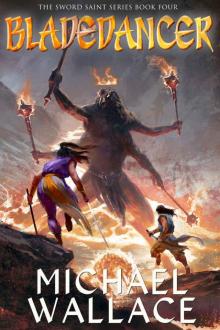 Bladedancer
Bladedancer Sword Saint
Sword Saint The Alliance Trilogy
The Alliance Trilogy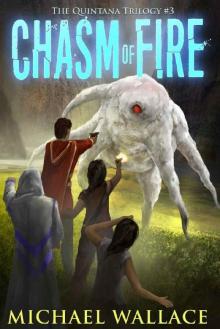 Chasm of Fire
Chasm of Fire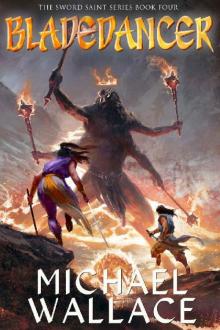 Bladedancer (The Sword Saint Series Book 4)
Bladedancer (The Sword Saint Series Book 4) The Devil's Deep
The Devil's Deep Shadow Walker (The Sword Saint Series Book 3)
Shadow Walker (The Sword Saint Series Book 3) Starship Blackbeard
Starship Blackbeard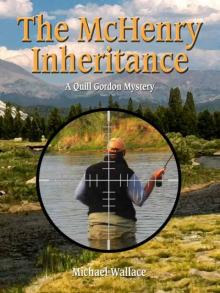 The McHenry Inheritance (Quill Gordon Mystery Book 1)
The McHenry Inheritance (Quill Gordon Mystery Book 1) Sun King (The Void Queen Trilogy Book 3)
Sun King (The Void Queen Trilogy Book 3) Blood of Vipers
Blood of Vipers Righteous - 01 - The Righteous
Righteous - 01 - The Righteous I Scarce Can Die (Quill Gordon Mystery Book 5)
I Scarce Can Die (Quill Gordon Mystery Book 5)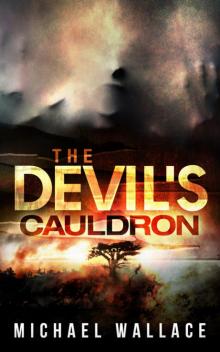 The Devil's Cauldron
The Devil's Cauldron The Wicked (The Righteous)
The Wicked (The Righteous) Crow Hollow
Crow Hollow Righteous03 - The Wicked
Righteous03 - The Wicked Righteous02 - Mighty and Strong
Righteous02 - Mighty and Strong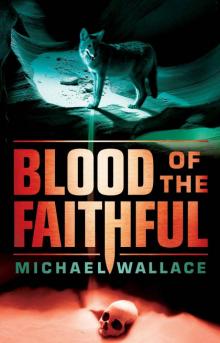 Blood of the Faithful
Blood of the Faithful Wash Her Guilt Away (Quill Gordon Mystery Book 2)
Wash Her Guilt Away (Quill Gordon Mystery Book 2) The Kingdom of the Bears
The Kingdom of the Bears The Emerald Crown (The Red Sword Trilogy Book 3)
The Emerald Crown (The Red Sword Trilogy Book 3) The Dark Citadel
The Dark Citadel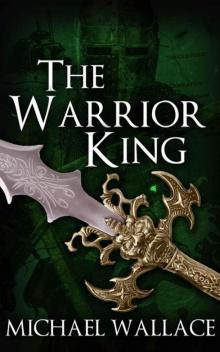 The Warrior King (Book 4)
The Warrior King (Book 4) Rebellion of Stars (Starship Blackbeard Book 4)
Rebellion of Stars (Starship Blackbeard Book 4) Righteous04 - The Blessed and the Damned
Righteous04 - The Blessed and the Damned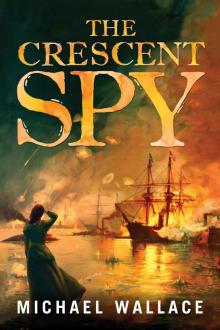 The Crescent Spy
The Crescent Spy Queen of the Void (The Void Queen Trilogy Book 1)
Queen of the Void (The Void Queen Trilogy Book 1)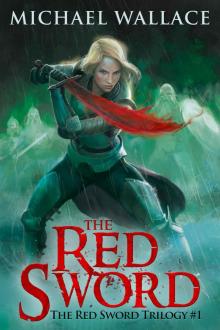 The Red Sword (The Red Sword Trilogy Book 1)
The Red Sword (The Red Sword Trilogy Book 1) The Sentinel (The Sentinel Trilogy Book 1)
The Sentinel (The Sentinel Trilogy Book 1)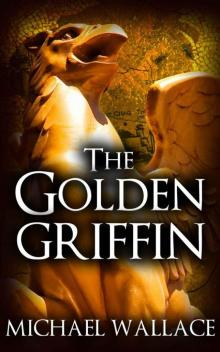 The Golden Griffin (Book 3)
The Golden Griffin (Book 3) The Blessed and the Damned (Righteous Series #4)
The Blessed and the Damned (Righteous Series #4) Hell's Fortress
Hell's Fortress Not Death, But Love (Quill Gordon Mystery Book 3)
Not Death, But Love (Quill Gordon Mystery Book 3) Destroying Angel
Destroying Angel The Free Kingdoms (Book 2)
The Free Kingdoms (Book 2) Dragon Quadrant (The Sentinel Trilogy Book 2)
Dragon Quadrant (The Sentinel Trilogy Book 2) Shattered Sun (The Sentinel Trilogy Book 3)
Shattered Sun (The Sentinel Trilogy Book 3)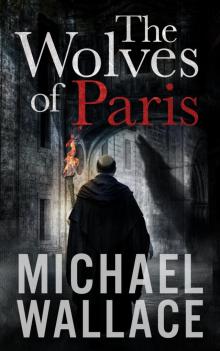 The Wolves of Paris
The Wolves of Paris Lords of Space (Starship Blackbeard Book 2)
Lords of Space (Starship Blackbeard Book 2) Dreadnought (Starship Blackbeard Book 3)
Dreadnought (Starship Blackbeard Book 3) The Village of Dead Souls: A Zombie Novel
The Village of Dead Souls: A Zombie Novel The Black Shield (The Red Sword Book 2)
The Black Shield (The Red Sword Book 2) The Daughters Of Alta Mira (Quill Gordon Mystery Book 4)
The Daughters Of Alta Mira (Quill Gordon Mystery Book 4) Mighty and Strong (The Righteous)
Mighty and Strong (The Righteous)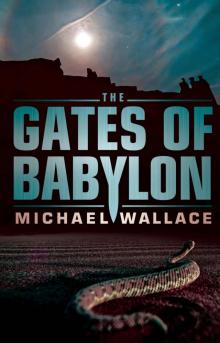 The Gates of Babylon
The Gates of Babylon